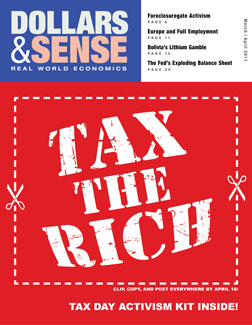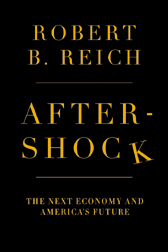This article is from Dollars & Sense: Real World Economics, available at http://www.dollarsandsense.org

This article is from the March/April 2011 issue of Dollars & Sense magazine.
Subscribe Now
at a 30% discount.

Across the Great Divide
A review of Aftershock: The Next Economy and America’s Future, by Robert Reich (New York: Alfred Knopf, 2010).
Although standing only 4-foot-10, Robert Reich has been a giant in political economy over the past several decades—and deservedly so. His latest book, Aftershock, shares the many positive qualities of his previous work. Its main message is important and bears repeating: rising inequality has bad economic and political consequences.
Reich begins by describing the recent rise of U.S. income inequality. In the late 1970s, the richest 1% of households received less than 9% of total U.S. income. By 2007 they received 23.5% of total income, nearly the identical percentage as in 1928, on the eve of the stock market crash and the Great Depression.
A large part of the blame for this, Reich contends, falls squarely on the government’s shoulders. It let the real minimum wage fall, failed to protect unions, slashed top tax rates, deregulated industry, and cut holes in the social safety net. Campaign contributions from the rich and extensive business lobbying “supported” these actions, as the locus of power shifted from workers to big business.
For Keynesian reasons, rising inequality generates macroeconomic problems. The wealthy receive more income than they can possibly spend; too little income goes to those who would spend it. Reduced demand then leads to high unemployment.
Reich argues that as wages failed to keep up with inflation, households sought to maintain their standard of living by working more (more women entered the workforce and many adults took a second job), reducing their savings, and going deep into debt. Stagnant wage growth also unleashed the forces leading to our recent recession and created a citizenry angry about an economic game rigged against them.
Inevitably, anger leads to political extremism. Reich fears some (unnamed) radical, female politician getting elected president. She bans all immigration, increases tariffs on imports, refuses to pay interest on government debt to China (thereby defaulting), and insists on a balanced federal budget. Shortly thereafter, the U.S. economy collapses.
Reich advances several policies to avoid this outcome—a more progressive income tax, with a top rate of 55% for those making more than $410,000 a year; wage insurance and retraining for the unemployed; more public investment in infrastructure and R&D; and health insurance (Medicare) for all. To take money out of politics, Reich makes a brilliant policy proposal: putting political contributions into blind trusts before they are given to politicians. Politicians would get all the money that is donated to their campaign, but they would not know where the money came from or how much money anyone gave them. Inexplicably, he also advocates school vouchers.
Although Reich has gotten the important things right, has focused on probably the most crucial problem confronting the U.S. economy today, and has written another book that is a joy to read, there are a few problems.
Aftershock offers more sound bites and fewer of the detailed arguments and specific policy proposals found in some of his earlier books. Reich’s claim that wives entered the labor force primarily to maintain household income ignores important sociological factors contributing to this change, and also the fact that the labor force participation of married women began rising in the 1960s—well before income inequality started to grow.
I was more perplexed that the author of Locked in the Cabinet, a delightful memoir of Reich’s frustrations pushing progressive policies during the first Clinton administration, could turn into such a pollyanna. Reich believes his proposals are “practical and doable.” But it is hard to see how they might get adopted given our current political climate, and Reich provides no roadmap to get us there. In December of 2010, the Bush tax cuts were extended for another two years. If we could not increase the top tax rate from 35% to 39.6% with large Democratic majorities in Congress and a Democratic president, it is not clear how and when 55% might be “doable.”
At times, Reich hones in on the real problem—voters get selfish (and angry) during hard economic times. Unlike the Great Depression, which led to the New Deal, our current crisis is not sufficiently severe to yield positive political results. We have not yet crossed over to the economic dark side. Reich should turn his incisive mind and rhetorical skills to explaining how we might enact policies to keep us from going there.
Did you find this article useful? Please consider supporting our work by donating or subscribing.
